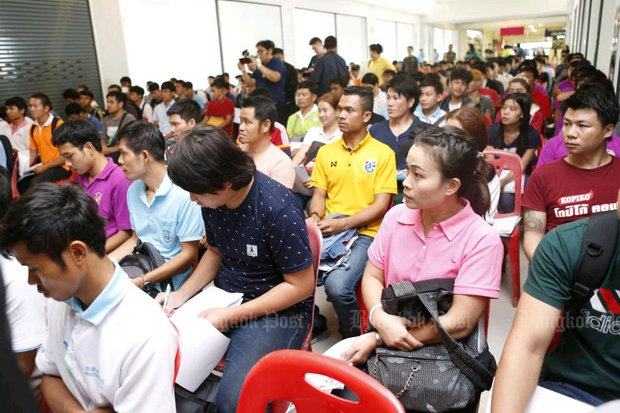
Breezing through language proficiency tests, one of the requirements for Thai workers seeking employment in South Korea, is no guarantee that female applicants will have an easy time finding work in the North Asian country.
Despite having passed the language tests, a 31-year-old woman from Satun found herself stuck on the list of applicants for almost two years before she was finally awarded an employment contract.
According to the woman, who chose to identify herself only as Ms A, the test scores are valid for two years and she knows several people, mostly women, who had to take a second or even third test because so much time elapsed that their previous scores "expired".
"I felt discouraged occasionally when I heard about the new language skill exams introduced over the past two years. It means more qualified workers are being added to the list, and employers have more choice," she said.
As her hope of getting hired began to fade, Ms A said she decided to become a phi noi, or little ghost, a term that refers to Thais who plan to work illegally in South Korea, usually by disguising themselves as tourists to enter the country.
However, her plan was foiled as the result of joint efforts by Thai and South Korean authorities to deal with illegal migrants. She never ended up boarding the plane.
The language proficiency test is part of South Korea's Employment Permit System (EPS) programme, established in 2004. Under the scheme, only 5,000 successful work applicants aged 18-39 are allowed to work there every year.
The number of Thai workers involved in the programme is below the legal quota because South Korean employers prefer hiring men over women, experts say, and Thai women usually outperform their male counterparts at the language exams.
A source at the Labour Ministry said the number of female Thai workers undergoing the EPS programme is low, accounting for about 15% of the total.
In the latest round of employment awarded late last year, 294 Thai workers were awarded work contracts. Of this number, 277 were men and 17 women.
According to the source, South Korea operates the EPS programme in 15 countries, some of which don't accept applications from women.
"Entrepreneurs in South Korea prefer male workers, and some countries send only male workers there. We can't do that so our quota of 5,000 is never used up," said the source.
Labour Minister Adul Sangsingkeo, who presided over the hand-over of employment contracts last last year, said he is well aware of the situation female job applicants face.
He said Thai authorities plan to contact South Korea to discuss the matter but admitted the final decision would rest with the entrepreneurs themselves.
"We'll ask them to consider hiring more women, but at the end of the day, it's their call," he said.
Pol Gen Adul said about 24,000 Thais are working in South Korea under the EPS programme. Another 120,000 are believed to be staying there and working illegally, he added.
The minister said Seoul would be asked to relax its rules so Thai workers could change jobs more easily. Restrictions on this are among the reasons cited for the high number of illegal workers there from the kingdom.
Many Thai workers who have valid working visas fall afoul of the authorities by switching jobs without following the proper steps as required under the country's labour law.
Saman Laodamrongchai, a senior researcher at Chulalongkorn University's Asian Research Centre for Migration, said the number of illegal Thai workers is expected to keep growing as South Korea recently increased the wages they can earn there.
The new rate of 1.745 million won (49,300 baht) per month will lure more illegal workers despite a looming crackdown, he said.
Mr Saman said South Korean employers, especially those in the agricultural industry, are facing labour shortages, which leads some companies to offer the same legally mandated wage to illegal workers.
South Korea is now implementing a voluntary departure programme to encourage illegal workers to exit without facing legal action or being blacklisted from re-entering. The deadline is March 31 this year.
Those who are arrested for overstaying their tourist visas will be deported and banned from revisiting the country for 10 years.